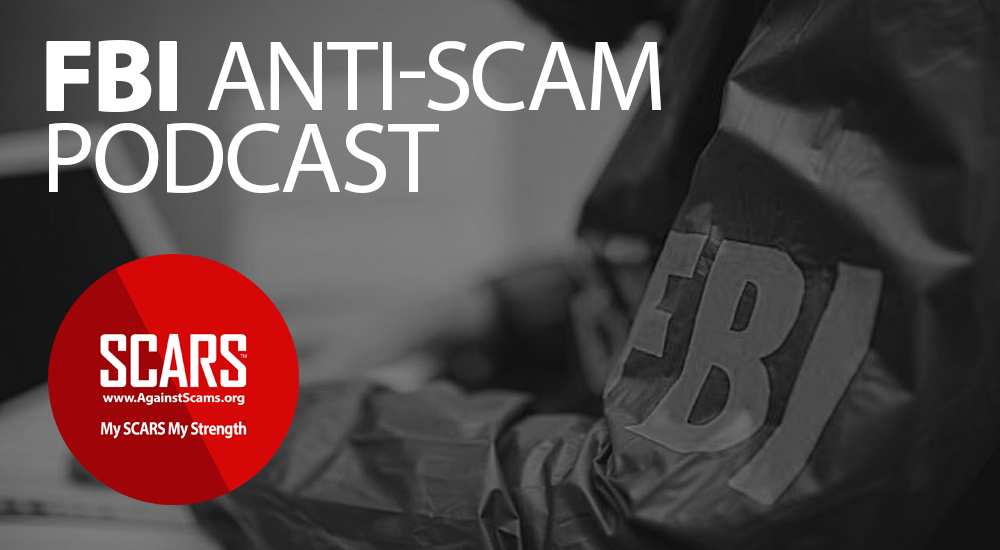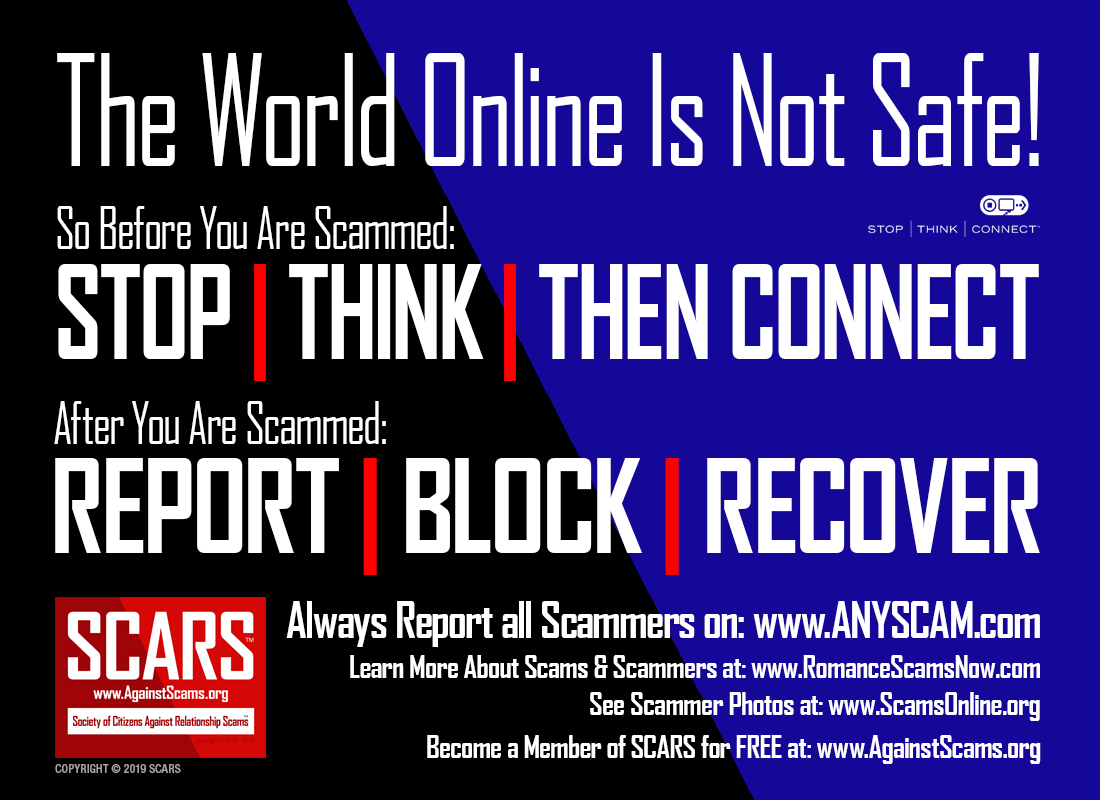
SCARS Institute’s Encyclopedia of Scams™ Published Continuously for 25 Years

Inside The FBI Podcast – Holiday Scams | Presented by SCARS
If you cannot play the podcast go to: Inside The FBI – Holiday Scams | Presented by SCARS on SoundCloud
Podcast Transcript
Monica Grover:
‘Twas the holiday season, when all through the land,
online shoppers clicked quickly to get gifts in hand.
But while they were adding treats and toys to their carts,
a holiday scammer was practicing his art.“Free gift cards! Free presents! Just follow this link!”
He hoped hurried shoppers would not stop and think.
But one savvy shopper saw the email and knew:
“This is a scam! It’s too good to be true!”To the IC3 the shopper reported the crime,
and that holiday scammer is now doing time.
We worked with our partners to solve this case,
but remember—your tips help keep us all safe!
Steve Lewis:
On this episode of Inside the FBI, we’re talking about holiday shopping scams.
While these sadly happen every year, we’re especially concerned about online scammers during the 2020 holiday shopping season. Because of the COVID-19 pandemic, more people may shop online than ever, which means more potential victims. Stay tuned to learn more about how to shop safely and smartly online.
I’m Steve Lewis, and this is Inside the FBI.
* * *
I’m Steve Lewis, and today on Inside the FBI, I’m talking with my colleague Monica Grover from the FBI’s Office of Public Affairs about tips to help you avoid getting scammed or hacked this holiday season.
Hi, Monica. So, our poem earlier mentioned the IC3. Can you start by telling us what that is? And what’s their role in combating online shopping scams and other internet crimes?
Monica Grover:
So, the IC3 is the FBI’s Internet Crime Complaint Center. The IC3 gives people a way to file complaints when they are the victim of an internet-enabled crime, like an online shopping scam. The IC3 collects and analyzes that information and shares it with law enforcement. The IC3 also closely tracks internet crimes and publishes regular reports and public service announcements to help people avoid scams.
You can report tips and get more information at ic3.gov.
Steve Lewis:
So, what are some of the most common scams and crimes related to online shopping?
Monica Grover:
You’ve got credit card fraud, non-delivery of things that people have paid for, and counterfeit items.
According to the IC3’s 2019 report, non-payment or non-delivery scams cost people more than $196 million. Credit card fraud accounted for another $100 million in losses.
These crimes are common, costly, and can happen to anyone.
Steve Lewis:
What can shoppers do to protect themselves, especially now that more of us are shopping online?
Monica Grover:
One of the most important tips is to know who you’re buying from. If you’re not sure of an individual or company, do your research and check reviews.
Always check the URL to make sure you’re on a legitimate and secure site. It can be really easy for someone to set up a flashy website that’s designed to scam shoppers. A site you’re buying from should have https in the web address. If it doesn’t, don’t enter your information on that site.
The other tip is a cliché for a reason: If it sounds too good to be true, it probably is. For example, if you find a sought-after toy or gift for much cheaper somewhere, you may never receive anything at all. Or, if you do, it might actually be a counterfeit item. If you do get an item you think is counterfeit, contact the manufacturer.
Steve Lewis:
What’s the safest way to pay when you’re shopping online?
Monica Grover:
First off, never wire money to a seller. Also avoid paying for items with pre-paid gift cards—in these scams, a seller will ask you to send them a gift card number and PIN. Instead of using that gift card for your payment, the scammer will steal the funds, and you’ll never receive your item. And in these cases, it’s virtually impossible to get back any of your money, too.
Use a credit card when shopping online and check your statement regularly. If you see a suspicious transaction, contact your credit card company to dispute the charge.
And always get a tracking number for items you buy online, so you can make sure they have been shipped, and you can follow the delivery process.
Steve Lewis:
What about suspicious emails and texts? What should we know about these?
Monica Grover:
Phishing scams and similar crimes get you to click on links and give up personal information like your name, password, and bank account number. In some cases, you unknowingly download malware. Basically, clicking any sort of suspicious link or attachment can potentially compromise your identity and your device.
It’s important to stay safe on social media, too. It’s another place where you might encounter suspicious links, even if it looks like it’s a post from a friend, or ads for deals that are too good to be true.
The best way to protect yourself online is to never click on anything unfamiliar or that you weren’t expecting. So, if a company you’ve never heard of and never done business with emails you a link or an attachment, don’t click directly on it. If you know that company’s URL, type it in manually to visit their site.
Be especially wary if a company asks you to update your password or account information. Look up the company’s phone number on your own and call the company.
Steve Lewis:
What should someone do if they think they’ve been scammed?
Monica Grover:
Definitely call your credit card company or bank. You should also reach out to your local law enforcement agency and, of course, report the scam to ic3.gov.
Steve Lewis:
Where can listeners go to learn more about these types of scams?
Monica Grover:
You can visit our website at fbi.gov/scams.
You can also check with our partners at the Federal Trade Commission at consumer.ftc.gov. Your state’s consumer protection office is a great resource, too.
Steve Lewis:
Keep these tips in mind and protect yourself, your information, and your wallet during the holiday season—and all year long.
This has been another production of Inside the FBI. I’m Steve Lewis with the FBI’s Office of Public Affairs. Thanks again for tuning in.
TAGS: SCARS, FBI, Federal Bureau of Investigation, United States Government, FBI.gov, IC3.gov, Podcast, MP3, Audio, Presented By SCARS, Holiday Scams, Information About Scams, Anti-Scam, Scams, Scammers, Fraudsters, Cybercrime, Crybercriminals, Scam Victims,
SCARS™ Team
Society of Citizens Against Relationship Scams Inc.
A Worldwide Crime Victims Assistance Nonprofit Organization
Visit: www.AgainstScams.org
Contact Us: Contact@AgainstScams.org
PLEASE SHARE OUR ARTICLES WITH YOUR FRIENDS & FAMILY
HELP OTHERS STAY SAFE ONLINE – YOUR KNOWLEDGE CAN MAKE THE DIFFERENCE!
The Latest SCARS Posts:
FIND MORE SCAM NEWS
«SCAMCRIME.COM»
JOIN US ON FACEBOOK
«CLICK HERE»
END
MORE INFORMATION
– – –
Tell us about your experiences with Romance Scammers in our
« Scams Discussion Forum on Facebook »
– – –
FAQ: How Do You Properly Report Scammers?
It is essential that law enforcement knows about scams & scammers, even though there is nothing (in most cases) that they can do.
Always report scams involving money lost or where you received money to:
- Local Police – ask them to take an “informational” police report – say you need it for your insurance
- U.S. State Police (if you live in the U.S.) – they will take the matter more seriously and provide you with more help than local police
- Your National Police or FBI « www.IC3.gov »
- The SCARS|CDN™ Cybercriminal Data Network – Worldwide Reporting Network on « www.Anyscam.com »
This helps your government understand the problem, and allows law enforcement to add scammers on watch lists worldwide.
– – –
To learn more about SCARS visit « www.AgainstScams.org »
Please be sure to report all scammers
on « www.Anyscam.com »
Disclaimer:
SCARS IS A DIGITAL PUBLISHER AND DOES NOT OFFER HEALTH OR MEDICAL ADVICE, LEGAL ADVICE, FINANCIAL ADVICE, OR SERVICES THAT SCARS IS NOT LICENSED OR REGISTERED TO PERFORM.
IF YOU’RE FACING A MEDICAL EMERGENCY, CALL YOUR LOCAL EMERGENCY SERVICES IMMEDIATELY, OR VISIT THE NEAREST EMERGENCY ROOM OR URGENT CARE CENTER. YOU SHOULD CONSULT YOUR HEALTHCARE PROVIDER BEFORE FOLLOWING ANY MEDICALLY RELATED INFORMATION PRESENTED ON OUR PAGES.
ALWAYS CONSULT A LICENSED ATTORNEY FOR ANY ADVICE REGARDING LEGAL MATTERS.
A LICENSED FINANCIAL OR TAX PROFESSIONAL SHOULD BE CONSULTED BEFORE ACTING ON ANY INFORMATION RELATING TO YOUR PERSONAL FINANCES OR TAX RELATED ISSUES AND INFORMATION.
This content and other material contained on the website, apps, newsletter, and products (“Content”), is general in nature and for informational purposes only and does not constitute medical, legal, or financial advice; the Content is not intended to be a substitute for licensed or regulated professional advice. Always consult your doctor or other qualified healthcare provider, lawyer, financial, or tax professional with any questions you may have regarding the educational information contained herein. SCARS makes no guarantees about the efficacy of information described on or in SCARS’ Content. The information contained is subject to change and is not intended to cover all possible situations or effects. SCARS does not recommend or endorse any specific professional or care provider, product, service, or other information that may be mentioned in SCARS’ websites, apps, and Content unless explicitly identified as such.
The disclaimers herein are provided on this page for ease of reference. These disclaimers supplement and are a part of SCARS’ website’s Terms of Use.
Legal Notices:
All original content is Copyright © 1991 – 2020 Society of Citizens Against Relationship Scams Inc. (D.B.A SCARS) All Rights Reserved Worldwide & Webwide. Third-party copyrights acknowledge.
SCARS, SCARS|INTERNATIONAL, SCARS, SCARS|SUPPORT, SCARS, RSN, Romance Scams Now, SCARS|INTERNATION, SCARS|WORLDWIDE, SCARS|GLOBAL, SCARS, Society of Citizens Against Relationship Scams, Society of Citizens Against Romance Scams, SCARS|ANYSCAM, Project Anyscam, Anyscam, SCARS|GOFCH, GOFCH, SCARS|CHINA, SCARS|CDN, SCARS|UK, SCARS|LATINOAMERICA, SCARS|MEMBER, SCARS|VOLUNTEER, SCARS Cybercriminal Data Network, Cobalt Alert, Scam Victims Support Group, are all trademarks of Society of Citizens Against Relationship Scams Inc., All Rights Reserved Worldwide
Contact the law firm for the Society of Citizens Against Relationship Scams Incorporated by email at legal@AgainstScams.org
-/ 30 /-
What do you think about this?
Please share your thoughts in a comment below!
Table of Contents
- Podcast Transcript
- Ethereum ETHM Token Trap and Pig Butchering Scams – 2026
- New U.S. Law – S.3643 – 118th Congress – Will Dramatically Impact Scammers and Terrorists – 2026
- How Scam Survivors Can Survive Valentine’s Day – 2026
- U.S. Veterans Benefits Scams – 2026
- New AI Voice Cloning Phone Scams – 2026
- An Essay on Justice and Money Recovery – 2026
- Tell us about your experiences with Romance Scammers in our
« Scams Discussion Forum on Facebook » - FAQ: How Do You Properly Report Scammers?
- Please be sure to report all scammers
on « www.Anyscam.com »
LEAVE A COMMENT?
Recent Comments
On Other Articles
- Arwyn Lautenschlager on Love Bombing And How Romance Scam Victims Are Forced To Feel: “I was love bombed to the point that I would do just about anything for the scammer(s). I was told…” Feb 11, 14:24
- on Dani Daniels (Kira Lee Orsag): Another Scammer’s Favorite: “You provide a valuable service! I wish more people knew about it!” Feb 10, 15:05
- on Danielle Delaunay/Danielle Genevieve – Stolen Identity/Stolen Photos – Impersonation Victim UPDATED 2024: “We highly recommend that you simply turn away form the scam and scammers, and focus on the development of a…” Feb 4, 19:47
- on The Art Of Deception: The Fundamental Principals Of Successful Deceptions – 2024: “I experienced many of the deceptive tactics that romance scammers use. I was told various stories of hardship and why…” Feb 4, 15:27
- on Danielle Delaunay/Danielle Genevieve – Stolen Identity/Stolen Photos – Impersonation Victim UPDATED 2024: “Yes, I’m in that exact situation also. “Danielle” has seriously scammed me for 3 years now. “She” (he) doesn’t know…” Feb 4, 14:58
- on An Essay on Justice and Money Recovery – 2026: “you are so right I accidentally clicked on online justice I signed an agreement for 12k upfront but cd only…” Feb 3, 08:16
- on The SCARS Institute Top 50 Celebrity Impersonation Scams – 2025: “Quora has had visits from scammers pretending to be Keanu Reeves and Paul McCartney in 2025 and 2026.” Jan 27, 17:45
- on Scam Victims Should Limit Their Exposure To Scam News & Scammer Photos: “I used to look at scammers photos all the time; however, I don’t feel the need to do it anymore.…” Jan 26, 23:19
- on After A Scam, No One Can Tell You How You Will React: “This article was very informative, my scams happened 5 years ago; however, l do remember several of those emotions and/or…” Jan 23, 17:17
- on Situational Awareness and How Trauma Makes Scam Victims Less Safe – 2024: “I need to be more observant and I am practicing situational awareness. I’m saving this article to remind me of…” Jan 21, 22:55
ARTICLE META
Important Information for New Scam Victims
- Please visit www.ScamVictimsSupport.org – a SCARS Website for New Scam Victims & Sextortion Victims
- Enroll in FREE SCARS Scam Survivor’s School now at www.SCARSeducation.org
- Please visit www.ScamPsychology.org – to more fully understand the psychological concepts involved in scams and scam victim recovery
If you are looking for local trauma counselors please visit counseling.AgainstScams.org or join SCARS for our counseling/therapy benefit: membership.AgainstScams.org
If you need to speak with someone now, you can dial 988 or find phone numbers for crisis hotlines all around the world here: www.opencounseling.com/suicide-hotlines
A Note About Labeling!
We often use the term ‘scam victim’ in our articles, but this is a convenience to help those searching for information in search engines like Google. It is just a convenience and has no deeper meaning. If you have come through such an experience, YOU are a Survivor! It was not your fault. You are not alone! Axios!
A Question of Trust
At the SCARS Institute, we invite you to do your own research on the topics we speak about and publish, Our team investigates the subject being discussed, especially when it comes to understanding the scam victims-survivors experience. You can do Google searches but in many cases, you will have to wade through scientific papers and studies. However, remember that biases and perspectives matter and influence the outcome. Regardless, we encourage you to explore these topics as thoroughly as you can for your own awareness.
Statement About Victim Blaming
SCARS Institute articles examine different aspects of the scam victim experience, as well as those who may have been secondary victims. This work focuses on understanding victimization through the science of victimology, including common psychological and behavioral responses. The purpose is to help victims and survivors understand why these crimes occurred, reduce shame and self-blame, strengthen recovery programs and victim opportunities, and lower the risk of future victimization.
At times, these discussions may sound uncomfortable, overwhelming, or may be mistaken for blame. They are not. Scam victims are never blamed. Our goal is to explain the mechanisms of deception and the human responses that scammers exploit, and the processes that occur after the scam ends, so victims can better understand what happened to them and why it felt convincing at the time, and what the path looks like going forward.
Articles that address the psychology, neurology, physiology, and other characteristics of scams and the victim experience recognize that all people share cognitive and emotional traits that can be manipulated under the right conditions. These characteristics are not flaws. They are normal human functions that criminals deliberately exploit. Victims typically have little awareness of these mechanisms while a scam is unfolding and a very limited ability to control them. Awareness often comes only after the harm has occurred.
By explaining these processes, these articles help victims make sense of their experiences, understand common post-scam reactions, and identify ways to protect themselves moving forward. This knowledge supports recovery by replacing confusion and self-blame with clarity, context, and self-compassion.
Additional educational material on these topics is available at ScamPsychology.org – ScamsNOW.com and other SCARS Institute websites.
Psychology Disclaimer:
All articles about psychology and the human brain on this website are for information & education only
The information provided in this article is intended for educational and self-help purposes only and should not be construed as a substitute for professional therapy or counseling.
While any self-help techniques outlined herein may be beneficial for scam victims seeking to recover from their experience and move towards recovery, it is important to consult with a qualified mental health professional before initiating any course of action. Each individual’s experience and needs are unique, and what works for one person may not be suitable for another.
Additionally, any approach may not be appropriate for individuals with certain pre-existing mental health conditions or trauma histories. It is advisable to seek guidance from a licensed therapist or counselor who can provide personalized support, guidance, and treatment tailored to your specific needs.
If you are experiencing significant distress or emotional difficulties related to a scam or other traumatic event, please consult your doctor or mental health provider for appropriate care and support.
Also read our SCARS Institute Statement about Professional Care for Scam Victims – click here to go to our ScamsNOW.com website.















![To Be A Scammer? An Overview Of Scammers Fraudsters & Online Con Artists - 2024 [UPDATED] what is a scammer what-is-a-scammer](https://romancescamsnow.com/wp-content/uploads/2021/10/what-is-a-scammer.png)
![New Research Study on Stolen Valor - Military Scams - STUDY NOW COMPLETED [UPDATED] Military Impersonation Research Study New Research Study on Stolen Valor - Military Scams](https://romancescamsnow.com/wp-content/uploads/2022/03/Military-Impersonation-Research-Study.png)







Thank you for your comment. You may receive an email to follow up. We never share your data with marketers.